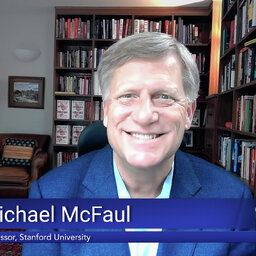Rainer Lohmann on His Research on Toxic Chemicals in Our Environment and Our Future With Them
Season 14
Story in the Public Square is a weekly, 30-minute series that brings audiences to the intersection of storytelling and public affairs. Hosted by Jim L…Persistent Organic Pollutants: you don’t need a Ph.D. in chemistry to recognize realize they are dangerous. But Dr. Rainer Lohmann has been studying POPs for some time and their danger to the environment and human beings.
Lohmann’s research combines marine organic geochemistry and environmental chemistry to study recalcitrant organic compounds, including persistent organic pollutants on the molecular level. He has led Superfund Research Center at the University of Rhode Island since 2018, one among roughly 20 nationwide. The Center is a collaboration with scientists from Harvard University and the Silent Spring Institute. It focuses on the Sources, Transport, Exposure and Effects of PFASs—poly- and perfluorinated alkyl substances. Lohmann has engaged decision-makers by working with scientists from the U.S. Environmental Protection Agency and Environment Canada to advance the use of novel sampling devices to better characterize fluxes of organic pollutants in water and air. Lohmann is currently one of several scientists from around the world coordinating the AQUA-GAPS program, a joint effort with the Czech Republic’s RECETOX initiative at Masaryk University, which conducts research and education around managing the environmental and health risks associated with the chemicals around us. The AQUA-GAPS program promotes the use of passive samplers for legacy and emerging organic contaminants in the waters of the world is now underway.
In 2 playlist(s)
Story in the Public Square
Story in the Public Square is a weekly, 30-minute series that brings audiences to the intersection o…Social links
Follow podcast
Recent clips

The future of the Voice of America with Patsy Widakuswara
27:57

Michael McFaul on the enduring strength of American democracy
29:01

A closer look at immigration policy today with Caitlin Dickerson
28:30
 Story in the Public Square
Story in the Public Square
